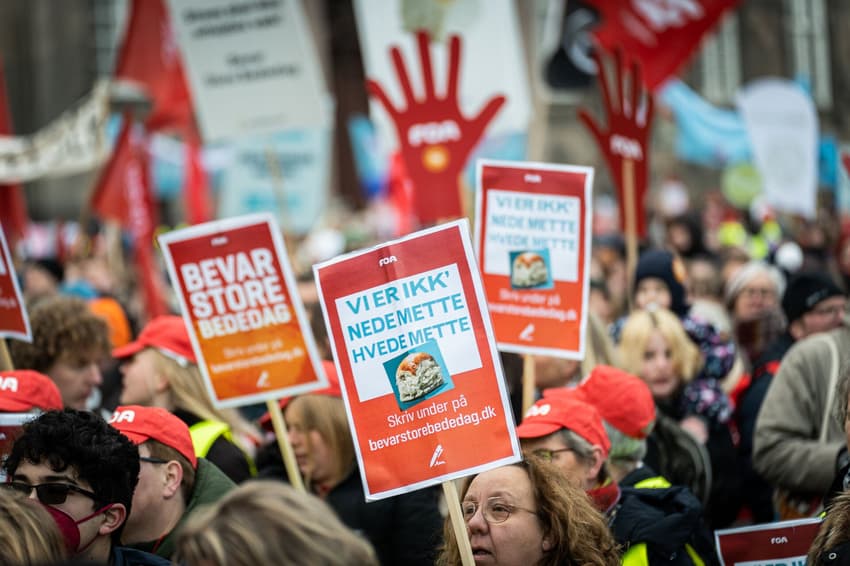Danish parliament calls public to hearing over Great Prayer Day abolition

The Danish parliament has put out a call for members of the public who want to have a say on the planned abolition of the Great Prayer Day public holiday.
Debate over the plan to scrap the holiday has been a major talking point since it was announced by the coalition government at the end of last year.
Parliament’s website states that its committee for employment (Beskæftigelsesudvalg) is responsible for the hearing, which is open to the public. The date of the hearing will be February 22nd and registration will be required.
“This is a very good tool because it is important to get things in the open before we vote in the parliamentary chamber,” the chairman of the committee, Social Democrat MP Bjarne Laustsen, told news wire Ritzau.
“Regardless of whether you agree or disagree, it’s important that we MPs can hear people about a topic. Then you can weigh things up afterwards,” he said.
The three governing parties – the Social Democrats, Liberals (Venstre) and Moderates – want to abolish the springtime public holiday in a move they say will enable increased defence spending to meet Nato targets by 2030, three years ahead of the current schedule.
A bill was tabled by the government in January.
The policy has met with criticism from trade unions, the church and opposition parties, while the military has also distanced itself from the plan. Thousands of Danes took part in a demonstration against it outside parliament earlier this month.
READ ALSO:
- Why does Denmark have an annual ‘Prayer Day’ holiday?
- Denmark formalises plan to abolish public holiday
- Danes protest against plan to abolish public holiday
An agenda for the public hearing is yet to be finalised, but it is expected to take up to two and a half hours.
“This is a complex topic. Of course it is,” he said.
“The speakers who are coming must write their points down so we are clear about them and don’t have to start from the beginning,” he said.
“That qualifies debate so we can have a better debate with people who have one view or another,” he said.
Economics and labour market analysts are among those who could take part in the hearing, he said.
Places at the hearing will be limited and given on a first-come, first-served basis. Registration is via the parliament’s website. It will also be broadcast on the parliament’s website.
Comments
See Also
Debate over the plan to scrap the holiday has been a major talking point since it was announced by the coalition government at the end of last year.
Parliament’s website states that its committee for employment (Beskæftigelsesudvalg) is responsible for the hearing, which is open to the public. The date of the hearing will be February 22nd and registration will be required.
“This is a very good tool because it is important to get things in the open before we vote in the parliamentary chamber,” the chairman of the committee, Social Democrat MP Bjarne Laustsen, told news wire Ritzau.
“Regardless of whether you agree or disagree, it’s important that we MPs can hear people about a topic. Then you can weigh things up afterwards,” he said.
The three governing parties – the Social Democrats, Liberals (Venstre) and Moderates – want to abolish the springtime public holiday in a move they say will enable increased defence spending to meet Nato targets by 2030, three years ahead of the current schedule.
A bill was tabled by the government in January.
The policy has met with criticism from trade unions, the church and opposition parties, while the military has also distanced itself from the plan. Thousands of Danes took part in a demonstration against it outside parliament earlier this month.
READ ALSO:
- Why does Denmark have an annual ‘Prayer Day’ holiday?
- Denmark formalises plan to abolish public holiday
- Danes protest against plan to abolish public holiday
An agenda for the public hearing is yet to be finalised, but it is expected to take up to two and a half hours.
“This is a complex topic. Of course it is,” he said.
“The speakers who are coming must write their points down so we are clear about them and don’t have to start from the beginning,” he said.
“That qualifies debate so we can have a better debate with people who have one view or another,” he said.
Economics and labour market analysts are among those who could take part in the hearing, he said.
Places at the hearing will be limited and given on a first-come, first-served basis. Registration is via the parliament’s website. It will also be broadcast on the parliament’s website.
Join the conversation in our comments section below. Share your own views and experience and if you have a question or suggestion for our journalists then email us at [email protected].
Please keep comments civil, constructive and on topic – and make sure to read our terms of use before getting involved.
Please log in here to leave a comment.